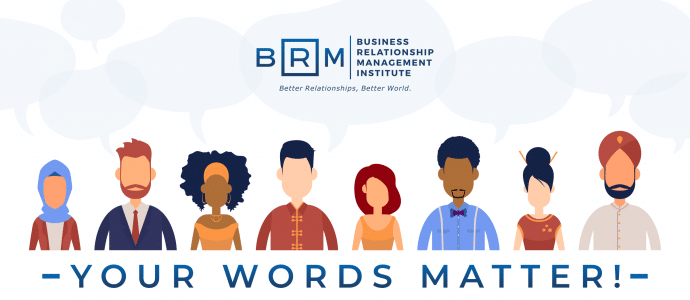
The Power of Words

How to build verbal agility
Posted August 23, 2022 | Reviewed by Hara Estroff Marano
Words are enormously powerful tools that most people don’t fully appreciate. Although people recognize the importance of communication skills, they don’t necessarily grasp how to become more effective communicators.
When people develop true mental agility in working with language, they gain a range of skills that make them more highly effective communicators. Attuned to the nuances of words, they become expert at working in teams because they can communicate clearly and translate the real meaning of what one person says to another person. They are able to separate their emotional reaction to a report or news article from their cognitive reaction and as a result can glean what’s really significant. They can “read” other people by the words they use and the way they use them.
Language is a neurocognitive tool by which we can:
· Transmit and exchange information
· Influence and control the behavior of others
· Establish and demonstrate social cohesion, and
· Imagine and create new ways of experiencing life.
To appreciate the power and majesty of words, we have to recognize that they mean more than their dictionary definitions. Words require context to make them meaningful. We understand them in relation to other words. A single word such as light can evoke different images and emotions at different times: The Charge of the Light Brigade , a light snack, the light at the end of the tunnel, lighthearted, lightweight, lightbulb, light of my life, and more.
We understand others best when we can identify the purpose that frames the words. For example, reports are intended to help people crystallize a problem. A good report contains information that is verifiable. A good report writer carefully avoids inferences, judgments, and inflammatory language that might bias the reader and affect the quality of the work.
On the other hand, preachers, parents, teachers, propagandists, politicians, and employers use directives to influence and control the future behavior of their listeners or readers. Directives promise rewards and/or consequences. Those that have the strongest impact engage people’s emotions through the dramatic application of tone, rhyme, rhythm, and repetition, devices through which the message is embedded in our memory .
Words are so much a part of our human experience that we need to disengage ourselves from them. We disengage by turning words into objects—by playing word games. People who play with words are more conscious of the subtleties and innuendos that conversations contain and are less likely to be swayed by emotional appeals or fall victim to their own prejudices.
Difficult crossword puzzles, such as the New York Times crossword puzzle, force solvers to pursue increasingly subtle clues as the week progresses and the puzzles get harder. Think about all those people you know who brag that they do the New York Times crossword puzzle in ink. Doing the puzzle in ink intimates that their verbal agility is such that they won’t make mistakes and need to erase answers in order to try again.
Wordle erupted in popularity in 2021, making players guess a five-letter word by staring with a random guess. As the player guesses letters correctly, they appear in yellow or green—yellow means it’s in the day’s word and green means that it’s in the day’s word and you’ve put it in the correct place. Players are limited to six guesses. Guessing the day’s word with no other context but your vocabulary and understanding of spelling conventions forces players to think about words differently.
Turning One Word into Another
It takes a long time to learn to read and even longer to learn to read well. Once that threshold has been crossed, we become efficient readers. We read automatically—traffic signs, cereal boxes, billboards, t-shirts. In fact, we can’t stop ourselves from reading when we see what looks like a word.
In the verbal puzzle below, you will need to bring out your Wordle skills to understand how one word can follow a pattern to turn into a series of different words. The word on the far left on the first line is SEED and the word on the far right is PICK . In the example, you can see how changing one letter each time can get you from SEED to PICK. But you need to take into account what that last word is so that you can make the appropriate guesses.

SEED SEEK PEEK PECK PICK
HANK ____ ____ ____ PORT
HARE ____ ____ ____ COOK
MAUL ____ ____ ____ WILD
ROOD ____ ____ ____ LICK
HELP ____ ____ ____ ROAM
TEST ____ ____ ____ PORE
DILL ____ ____ ____ BOOT
TUBA ____ ____ ____ DONE
DIVE ____ ____ ____ HART
DUNK ____ ____ ____ BEET
MUST ____ ____ ____ DOCK
LIFE ____ ____ ____ DEBT
HAIR ____ ____ ____ DEAN
DELL ____ ____ ____ VOTE
MITT ____ ____ ____ PACE
What makes the puzzle hard is that you have to switch between thinking abstractly and thinking concretely. The puzzle would be easy if all you had to do was randomly replace letters. By having to come up with a legitimate word each time, as in Wordle , you have to think through the words you know. Puzzles like this one help breed verbal agility.
HANK HARK PARK PART PORT
HARE CARE CORE CORK COOK
MAUL MALL WALL WILL WILD
ROOD ROOK ROCK LOCK LICK
HELP HEAP REAP REAM ROAM
TEST PEST POST PORT PORE
DILL DOLL BOLL BOLT BOOT
TUBA TUBE TUNE TONE DONE
DIVE HIVE HAVE HATE HART
DUNK BUNK BUNT BENT BEET
MUST DUST DUSK DUCK DOCK
LIFE LIFT LEFT DEFT DEBT
HAIR HEIR HEAR DEAR DEAN
DELL DOLL DOLE DOTE VOTE
MITT MITE MICE MACE PACE

Donalee Markus, Ph.D., specializes in the clinical application of neuroscience to rehabilitate concussion, stroke, and traumatic brain injury, enhance academic performance, and maintain memory skills.
- Find a Therapist
- Find a Treatment Center
- Find a Psychiatrist
- Find a Support Group
- Find Online Therapy
- United States
- Brooklyn, NY
- Chicago, IL
- Houston, TX
- Los Angeles, CA
- New York, NY
- Portland, OR
- San Diego, CA
- San Francisco, CA
- Seattle, WA
- Washington, DC
- Asperger's
- Bipolar Disorder
- Chronic Pain
- Eating Disorders
- Passive Aggression
- Personality
- Goal Setting
- Positive Psychology
- Stopping Smoking
- Low Sexual Desire
- Relationships
- Child Development
- Self Tests NEW
- Therapy Center
- Diagnosis Dictionary
- Types of Therapy

When we fall prey to perfectionism, we think we’re honorably aspiring to be our very best, but often we’re really just setting ourselves up for failure, as perfection is impossible and its pursuit inevitably backfires.
- Emotional Intelligence
- Gaslighting
- Affective Forecasting
- Neuroscience
People’s words and actions can actually shape your brain — a neuroscientist explains how
Share this idea.
- Click to share on Facebook (Opens in new window)
- Click to share on Twitter (Opens in new window)
- Click to share on LinkedIn (Opens in new window)
- Click to share on Reddit (Opens in new window)
- Click to share on Pocket (Opens in new window)
- Click to share on WhatsApp (Opens in new window)

We humans are a social species. We live in groups. We take care of one another. We build civilizations.
Our ability to cooperate has been a major adaptive advantage. It has allowed us to colonize virtually every habitat on Earth and thrive in more climates than any other animal, except maybe bacteria.
Part of being a social species, it turns out, is that we regulate one another’s body budgets — the ways in which our brains manage the bodily resources we use every day. For your whole life, outside of your awareness, you make deposits into other people’s body budgets, as well as withdrawals, and others do the same for you. This has pros and cons, as well as profound implications for how we live our lives.
Your family, friends and even strangers contribute to the structure and function of your brain and help it keep your body humming along.
How do the people around you influence your body budget and rewire your adult brain? Your brain changes its wiring after new experiences, a process called plasticity. Microscopic parts of your neurons change gradually every day. Branch-like dendrites become bushier, and their associated neural connections become more efficient. Little by little, your brain becomes tuned and pruned as you interact with others.
Some brains are more attentive to the people around them and others less so, but everybody has somebody. Ultimately, your family, friends, neighbors and even strangers contribute to your brain’s structure and function and help your brain keep your body humming along.
This co-regulation has measurable effects. When you’re with someone you care about, your breathing can synchronize, as can the beating of your hearts — whether you’re in casual conversation or a heated argument. This sort of physical connection happens between infants and caregivers, therapists and clients, even people taking a yoga class or singing in a choir together.
If you raise your voice or just your eyebrow, you can affect what goes on inside other people’s bodies.
We also adjust each other’s body budgets by our actions. If you raise your voice or just your eyebrow, you can affect what goes on inside other people’s bodies, such as their heart rate or the chemicals carried in their bloodstream. If a loved one is in pain, you can lessen their suffering merely by holding their hand.
Being a social species has all sorts of advantages for us humans, including the fact that we live longer if we have close, supportive relationships with others. Studies show that if you and your partner feel that your relationship is intimate and caring, that you’re responsive to each other’s needs and that life seems enjoyable when you’re together, both of you are less likely to get sick.
And if you’re already sick with a serious illness, such as cancer or heart disease, you’re more likely to get better. These studies were conducted on married couples, but the results appear to hold for close friendships and for pet owners too.
We also get sick and die earlier when we persistently feel lonely — possibly years earlier, based on the data.
In general, being a social species is good for us, but there are also disadvantages. We also get sick and die earlier when we persistently feel lonely — possibly years earlier, based on the data. Without others helping regulate our body budgets, we bear an extra burden inside.
Have you ever lost someone through a breakup or a death and felt like you’d lost a part of yourself? That’s because you did — you lost a source of keeping your bodily systems in balance.
A surprising disadvantage of shared body budgeting is its impact on empathy. When you have empathy for other people, your brain predicts what they will think and feel and do. The more familiar the other people are to you, the more efficiently your brain predicts their inner struggles. The whole process feels natural, as if you were reading another person’s mind.
But there’s a catch — when people are less familiar to you, it can be harder to empathize. You might have to learn more about the person, an extra effort that translates into more withdrawals from your body budget, which can feel unpleasant. This may be one reason why people sometimes fail to empathize with those who look different or believe different things and why it can feel uncomfortable to try. It’s metabolically costly for our brains to deal with things that are hard to predict.
A hateful word may cause your brain to flood your bloodstream with hormones, squandering resources from your body budget.
No wonder people create so-called echo chambers, surrounding themselves with news and views that reinforce what they already believe — it reduces the metabolic cost and unpleasantness of learning something new. Unfortunately, it also reduces the odds of learning something that could change a person’s mind.
We also regulate each other with words — a kind word may calm you, like when a friend gives you a compliment at the end of a hard day. And a hateful word may cause your brain to predict threat and flood your bloodstream with hormones, squandering precious resources from your body budget.
The power of words over your biology can span great distances. I can text the words “I love you” from the US to my close friend in Belgium, and even though she cannot hear my voice or see my face, I will change her heart rate, her breathing and her metabolism.
Or, someone could text something ambiguous to you like “Is your door locked?” and odds are that it would affect your nervous system in an unpleasant way.
Your nervous system can be perturbed not only across distances, but also across centuries. If you’ve ever taken comfort from ancient texts such as the Bible or the Koran, you’ve received body-budgeting assistance from people long gone.
Books, videos and podcasts can warm you or give you the chills. These effects might not last long, but research shows that we all can tweak one another’s nervous systems with mere words in very physical ways that go beyond what you might suspect.
The power of words is not a metaphor; it’s in our brain wiring.
Why do the words you encounter have such wide-ranging effects inside you? Because many brain regions that process language also control the insides of your body, including major organs and systems that manage your body budget.
These brain regions are contained in what scientists call the “language network” and guide your heart rate up and down. They adjust the glucose entering your bloodstream to fuel your cells. They change the flow of chemicals that support your immune system.
The power of words is not a metaphor; it’s in our brain wiring. We see similar wiring in other animals; for example, neurons that are important for birdsong also control the organs of a bird’s body.
Words, then, are tools for regulating human bodies. Other people’s words have a direct effect on your brain activity and your bodily systems, and your words have that same effect on other people. Whether you intend that effect is irrelevant. It’s how we’re wired.
Does this mean that words can be harmful to your health? In small doses, not really. When someone says things you don’t like, insults you or even threatens your physical safety, you might feel awful.
Over time, anything that contributes to chronic stress can gradually eat away at your brain — this includes verbal aggression, social rejection and neglect.
Your body budget is taxed in that moment, but there’s no physical damage to your brain or body. Your heart might race, your blood pressure might change, you might ooze sweat, but then your body recovers and your brain might be a bit stronger afterward.
Evolution gifted you with a nervous system that can cope with temporary metabolic changes and even benefit from them. Occasional stress can be like exercise — brief withdrawals from your body budget followed by deposits create a stronger, better you.
But if you are stressed over and over and over again without much opportunity to recover, the effects can be far more grave. If you constantly struggle in a simmering sea of stress and your body budget accrues an ever-deepening deficit, that’s called chronic stress. It does more than just make you miserable in the moment.
Over time, anything that contributes to chronic stress can gradually eat away at your brain and cause illness in your body. This includes physical abuse, verbal aggression, social rejection, neglect and the countless other creative ways that we social animals torment one another.
It’s important to understand that the human brain doesn’t seem to distinguish between sources of chronic stress. If your body budget is already depleted by the circumstances of life — like physical illness, financial hardship, hormone surges, not sleeping or exercising enough — your brain becomes more vulnerable to stress of all kinds. This includes the biological effects of words designed to threaten, bully or torment you or people you care about.
When your body budget is continually burdened, momentary stressors pile up, even the kind you’d normally bounce back from. It’s like children jumping on a bed — the bed might withstand 10 kids bouncing but the 11th one snaps the bed frame.
Simply put, a long period of chronic stress can harm a human brain. When you’re on the receiving end of sustained verbal aggression, studies show you’re more likely to get sick. Scientists don’t understand all the underlying mechanisms yet, but we know it happens.
These studies of verbal aggression tested average people across the political spectrum, left, right and center. If people insult you, their words won’t hurt your brain the first or second time or maybe even the twentieth.
We are free to speak and act, but we are not free from the consequences of what we say and do.
But if you’re exposed to verbal aggression continually for months or if you live in an environment that relentlessly taxes your body budget, words can physically injure your brain. Not because you’re weak or a so-called snowflake, but because you’re a human.
Your nervous system is bound up with the behavior of other humans, for better or for worse. You can argue what the data means or if it’s important, but it is what it is.
It’s the fundamental dilemma of the human condition: The best thing for your nervous system is another human and the worst thing for your nervous system is another human. Scientists are often asked to make our research useful to everyday life, and these findings about words, chronic stress and disease are a perfect example. There is a real biological benefit when people treat one another with basic human dignity.
A realistic approach to our dilemma is to realize that freedom always comes with responsibility. We are free to speak and act, but we are not free from the consequences of what we say and do. We might not care about those consequences or we might not agree that those consequences are justified, but they nonetheless have costs that we all pay.
We pay the costs of increased health care for illnesses — like diabetes, cancer, depression, heart disease and Alzheimer’s disease — that are worsened by chronic stress. We pay the costs of ineffective government when politicians spew vitriol at one another and make personal attacks instead of having reasoned debate. We pay the costs of a citizenry that struggles to discuss politically charged topics with one another productively, a standoff that weakens our democracy.
As our society makes decisions about health care, the law, public policy and education, we can ignore our socially dependent nervous systems, or we can take them seriously. Our biology won’t just go away.
Excerpted from the new book 7 1/2 Lessons about the Brain by Lisa Feldman Barrett. Copyright © 2020 by Lisa Feldman Barrett. Used with permission from Houghton Mifflin Harcourt Publishing Company. All rights reserved.
Watch her TED@IBM Talk here:
About the author
Lisa Feldman Barrett PhD is among the top 1% most cited scientists in the world for her research in psychology and neuroscience. She is a University Distinguished Professor at Northeastern University with appointments at the Massachusetts General Hospital and Harvard Medical School. Dr. Barrett was awarded a Guggenheim fellowship in neuroscience in 2019, and she is a member of the American Academy of Arts and Sciences and the Royal Society of Canada. She lives in Boston. Visit her website at LisaFeldmanBarrett.com or follow her on Twitter at @LFeldmanBarrett.
- book excerpt
- Lisa Feldman Barrett
- neuroscience
- personal growth
- relationships
- ted institute
TED Talk of the Day

How to make radical climate action the new normal

Here’s how you can handle stress like a lion, not a gazelle

How to add new life to your relationships (even your best ones!)

Almost 200 nations are meeting now for COP27 -- here's what you need to know

3 types of normal forgetting -- and 1 that isn’t

Climatarian, flexitarian, vegetarian, vegan: Which diet is best for the planet? (And what do they mean?)

Why does it hurt so much when we get ghosted? A psychologist explains

How many steps a day do we really need to take? Here are the facts

Mental time travel is a great decision-making tool -- this is how to use it

6 ways to give that aren't about money

3 strategies for effective leadership, from a former astronaut
Why we need to create ai that thinks in ways that we can't even imagine.

Trying to pry open the black box of heartbreak


Bees can remember human faces -- and 7 other surprising facts about these important insects

How one scientist is growing miniature brains in her lab

The Irrefutable Power Of Words
You’ve experienced the power of words in a way you will never forget. Even now, the memory lingers.
How could a few small words have such a big impact on your life?
Words have power . And only when you experienced that power yourself — either as the giver or as the receiver — did you begin to understand it.
You can use the power of words to heal or comfort others. Or you can use it to tear them down. Your character shapes and is shaped by the way you use this power.
So, how can you make the most of it?
Examples of the Power of Spoken Words
Examples of the power of written words, why are words so powerful for humans, 1. speak the truth., 2. avoid exaggerations., 3. don’t use double standards., 4. don’t use your words to manipulate others., 5. be consistent in what you say., 6. speak mindfully., 7. use words to benefit others..
When was the last time you heard spoken words that changed your perspective on something or someone? Maybe the words felt like a sucker punch.
Or maybe they lit you up inside and inspired you to make a change.
Consider the following examples of spoken words:
- Speeches and Lectures
- Song Lyrics
- Conversations (spoken)
- Audiobooks or Podcasts
- Movies or TV shows
Now, see if you can recall any memories of negative words for each of these samples.
Are there songs you find difficult to listen to because of the negative lyrics? Or have you been avoiding someone because of a recent negative outburst?
Maybe you’re thinking of negative words you’ve never heard but that felt, in your mind, as though they’d been spoken aloud – and directly to you.
Guess what’s next.
Written words also have power — for the one who writes them and for those who read them.
You’ve felt this power. And maybe you’ve wielded it yourself.
Maybe you even consider it your superpower. You’re not wrong to call it that.
Consider the following examples:
- Journal entries
- Articles / Blog Posts
- Letters, Notes, and Emails
- Stories and Poems
- Awards / Commendations or Written Reprimands
- Books and Book Reviews
Never underestimate the power of a thoughtful note — or a love poem — or a compelling story.
The right words draw you in and build connections. The wrong words destroy relationships or prevent them from ever being built.
This is why marketers pay well for effective copywriting .
If your words can connect with your target audience and persuade them that paying for a particular product or service will change their life for the better, you most definitely have a superpower.
Use it for good.
Humans are the only species on this planet that has the power of speech and of the written word (as far as we know).
But in spite of the creative potential this power gives us, we spend more time exploring its destructive potential.
And we sabotage our own health and happiness when we do.
According to functional MRI scans (fMRI ), just looking at a list of negative words (including the word “NO”) worsens anxiety and depression.
And dwelling on those words can actually damage key structures in the brain — including those responsible for memory, feelings, and emotions.
Vocalizing that negativity releases more stress hormones, not only in you but in those who hear you.
Even silent worrying (about money, relationships, work, etc.) stimulates the release of neurochemicals that make you and those around you feel worse.
Empaths are particularly sensitive to this, but everyone around you is affected to some degree. And you as the ruminator suffer the most.
So, how can you turn things around?
7 Tips for Making Your Written and Spoken Words Powerful
“Words have the power to both destroy and heal. When words are both true and kind, they can change our world.” — Gautama Buddha
Trust is built on honesty; people want to know they can depend on you to tell them the truth, even when it hurts to hear it (and even if it makes you look bad).
There are times when lying can save a life. But in most cases, with relationships, a reputation for lying will rob you of your power to connect with them.
Without truth behind them, your words lose their meaning and become empty noise.
Saying “You never….” or “You always…” to berate others ensures that your negative message about them (which is personal) will eclipse whatever message you’re trying to send.
Very few people are consistent enough to “always” leave the toilet seat up or to “never” take out the garbage. And they know that.
So, if you accuse them of a perfect record of thoughtlessness, their own disagreement with your memory will make it difficult to pick up on the underlying request.
Double standards are when you have different rules or different expectations of two or more different people of equal ability in the same situation.
For example, if your employer, Biff, tells one employee, Jack, that all he needs to do is X and Y but then he tells Sally she’ll have to X, Y, and Z — and in less time — to receive the same reward (or 79% of it), he’s using the power of words (and money) to impose a double standard.
And once he does and word gets around, Biff’s own words will create an atmosphere of injustice.
No one wants to work for an employer who devalues and exploits others.
More Related Articles
9 Of The Best Writing Podcasts For Authors In 2019
12 Effective Tips On How To Write Faster
15 Common Grammar Mistakes That Kill Your Writing Credibility
Marketing isn’t about using words to pressure or manipulate people into spending their money on whatever you’re selling.
Neither is it about competing with other marketers to see who can use their words more effectively to make customers feel things.
If the only reason you’re trying to build a connection is to get something from the other person, they’ll pick up on that.
And even if you do persuade them to buy something, it’ll leave skid marks in their memory.
They’ll remember you as someone who used the power of words to line your own pockets at their expense. And their regret is your loss.
Consistency is saying or doing the same thing regardless of the circumstances, as long as those words or actions still apply.
It is possible to overdo consistency. And none of us is perfect.
But when it comes to the power of words, you don’t want to give anyone the impression that your words and actions will change whenever you feel the slightest pressure to change them — regardless of the consequences.
If someone’s words change too easily, they’re the verbal equivalent of shifting sands. You can’t build anything on them that won’t fall apart.
Fickle words have no power.
A daily mindfulness practice trains you to be aware of your thoughts and feelings, without judging them.
So, you can acknowledge that someone’s words or actions have made you feel devalued or manipulated.
But you don’t have to avenge your ego by using words as defense weapons.
You retain your power when you take a step back and use your words to restore balance instead.
When you use the power of beautiful words to express empathy rather than anger or condescension, you put the good of the souls involved ahead of your own impulses. You might also enjoy these mindfulness journal prompts .
Karma demands that we pay for every unkind word we speak or write. Every time we use the power of words against another soul, we guarantee that, sooner or later, we’ll experience the same pain we’ve inflicted.
Think of that the next time you look back at a conversation and wish you’d used the comeback that came to mind a half-hour later.
Or, better yet, think of that when you’re about to say (or write) a scathing response to someone who has verbally attacked you.
Even if you succeed in turning their own words against them, you’ll eventually realize that the victory wasn’t worth the alienation you caused.
Use your power to build them up instead.
Will you take advantage of the power of words?
Asking questions instead of resting on statements is another way to benefit from the power of words.
Questions open your mind, while statements (assumptions, snap judgments, and fixed beliefs) close it.
If you pride yourself on keeping an open mind — about people, ideas, and situations — you should be using words to ask more questions rather than to utter statements no one is allowed to question.
The words you speak can either promote growth and connection or undermine it.
Take a moment today to think of the words you want to be remembered for. Before you speak, think of the words you’d want to say if they were your last.
May the words you choose bless everyone who hears (or reads) them today.

Leave a Comment Cancel reply
This site uses Akismet to reduce spam. Learn how your comment data is processed .
The Neuroscience Behind Our Words
Opinion Posted August 8th, 2019 | Category: BRM Capability , Business Relationship Management Research , Professional Development | Contributed by Lindsey Horton

Sticks and Stones
“Sticks and stones may break my bones, but words can never hurt me.”
This phrase is reminiscent of childhood recess when we didn’t want others to know how hurtful their words truly were. However, the belief that physical injury is more painful than psychological or emotional injury is not necessarily true.
Scientific studies actually show that positive and negative words not only affect us on a deep psychological level , but they have a significant impact on the outcome of our lives.
Words Can Hurt Me
In their neuroscience experiment, “ Do Words Hurt ?”, Maria Richter and collaborating scientists monitored subjects’ brain responses to auditory and imagined negative words. During this process, they discovered painful or negative words increase Implicit Processing (IMP) within the subgenual anterior cingulate cortex (sACC).
Put frankly, their study proved that negative words release stress and anxiety-inducing hormones in subjects.
Additionally, a study found increased levels of anxiety in children associated with higher rates of negative self-talk. According to the study’s abstract,
“These results suggest negative self-talk plays a role in the generation or maintenance of anxiety in normal children.”
Ultimately, negative words, whether spoken, heard, or thought, not only cause situational stress, but also contribute to long-term anxiety .
Think Happy Thoughts
Naturally, the recognition that holding negative thoughts in our mind is enough to induce stress and anxiety hormones begs the question, “What effect do positive thoughts have?”
In their jointly written book, Words Can Change Your Brain , Dr. Andrew Newberg, a neuroscientist at Thomas Jefferson University, and Mark Robert Waldman, a communications expert state, “ a single word has the power to influence the expression of genes that regulate physical and emotional stress.”
Furthermore, according to these two experts in their field, exercising positive thoughts can quite literally change one’s reality.
“By holding a positive and optimistic [word] in your mind, you stimulate frontal lobe activity. This area includes specific language centers that connect directly to the motor cortex responsible for moving you into action. And as our research has shown, the longer you concentrate on positive words, the more you begin to affect other areas of the brain.”
Over time, given sustained positive though, functions in the parietal lobe start to change. Consequently, this changes our perception of the self and those around us. Essentially, holding a positive view of ourselves helps train our brain to see the good in others.
Thus, by exercising consistent positive thoughts and speech , we not only change our self-perception, but how we perceive the world around us. Ultimately, this grants us the ability the shape our reality and change the world for the better.
BRMs: Using Positive Language to Drive Value
Evidently, as humans, our thought patterns directly shape our perception of the world and those around us. Our thoughts become our words, and therefore our language.
This holds true for humans individually, as well as organizationally. A strong company culture is one derived from a shared positive language based on organizational core values.
As BRMs, we know that relationships lie at the core of our role, and that language shapes our human interactions . So, how can we make a shift in the language we use in our daily work lives to reduce the negative associations with traditional “corporate lingo”?
In his article, “ Language Matters ”, Aaron Barnes, CEO of BRM Institute, dives deeply into the importance of positive language in elevating your business communications to drive value.
Take a look at a few examples of how you can shift towards positive language. As you do, really think about how each of these words or phrases make you feel, remember, or associate.
BRM Positive Language Shifts
- Capability instead of Process
- Convergence instead of Alignment
- Shared Ownership instead of Accountability
- Demand Shaping instead of Demand Management
- Business Capabilities instead of Services
Making these small changes in the words we use to express ideas creates a culture that doesn’t single out or place blame on any department or individual within the organization. Rather, it aims to promote transparency , elevate communications , and appreciate individual value .
In the end, shared positive language will promote effective communication and collaboration; breeding innovation, success, and organizational value.
“Language Matters” contains a comprehensive list of all the positive language shifts you can implement to drive effective communication across your enterprise.
For access to the full article, and to exclusive BRM-related knowledge and resources, join the BRM Community today!

109 Responses
[…] BRM Institute reports that positive and negative words have the power to affect us on a deep psychological level […]
[…] effect, so it’s important to be mindful of the language you use. The science behind the power of words explains how each and every word we speak creates sound waves and transmits messages into the […]
[…] the “language of grace,” which means that our language and word choice is always affirming. Studies have shown how positive language supports psychology and more successful outcomes. By investing in tools that affirm your staff’s gifts and build positivity, you can help nurture […]
[…] profound effect, so it’s important to be mindful of the language you use. The science behind the power of words explains how each and every word we speak creates sound waves and transmits messages into the […]
[…] The Neuroscience Behind Our Words […]
[…] scientifically proven that positive language has a strong impact on how other people perceive […]
[…] have found that using positive words such as “love” and “gratitude” can change a function of the parietal lo… in the brain. This function is about how we view ourselves and […]
[…] the “language of grace,” which means that our language and word choice is always affirming. Studies have shown how positive language supports psychology and more successful outcomes. By investing in tools that affirm your staff’s gifts and build positivity, you can help nurture […]
[…] ~Newburg, Waldman – SOURCE […]
[…] If you look in the mirror and comment on the reflection as ‘fat, ugly, short, too tall, stupid’ how do you think you will feel? Crappy. Look at the lovely reflection and see the beauty, say positive words like ‘smart, talented, pretty….’ The feelings are going to be much better. From the article The Neuroscience Behind our Words […]
[…] case you did not know, Scientific studies reveal that positive and negative words not only affect us on a deep psychological level, […]
[…] kinds of words directly affects the part of the brain that processes pain. In an article from the Business Relationship Management Institute, they reference a neuroscience experiment that indicates “ultimately, negative words, whether […]
[…] positive and negative language use has a sub-conscious effect on our behaviour, it can also affect outcomes. Be positive and stay […]
[…] turns our words also have staying power. Scientific studies show that positive and negative words not only affect us on a deep psychological level, but they […]
[…] turns our words also have staying power. Scientific studies show that positive and negative words not only affect us on a deep psychological level, but they […]
[…] This all maybe sounds a bit ridiculous, but there’s actually some science to back this concept up. Here is an excerpt from an article titled “The Neuroscience Behind Our Words” […]
[…] grief, inspiration when we long to be better, and show love to those around us. According to some studies, words can change the outcome of our entire lives. For isolated and lonely older adults, that […]
[…] By being aware of our language we cannot just have a positive impact on the outside world. It also affects our inside world, meaning our body and mind. A study shows that negative words, whether heard, thought or spoken can cause stress and anxiety. The good thing is that positive words have at least as much influence as negative ones. So, the exercise of positive thoughts can really change people’s reality. By doing this consequently, certain parts of the brain are trained. That effect changes our perception of the self and the world around us. Accordingly, at least as much as negative words can hurt and cause damage, positive words can have a great impact on our lives and the world. In a business context, there are some specific terms that can be shifted towards positive language. For example, use ‘capability’ instead of ‘process’ or replace ‘accountability’ with ‘shared ownership’. [4] […]
[…] Not fairly, however there’s truth in it. If you wish to be a extra positive particular person, it’s a must to begin by speaking like one. Here is why, in line with neuroscientist Dr. Andrew Newberg and communications expert Mark Robert Waldman: […]
[…] Not quite, but there’s truth in it. If you want to be a more positive person, you have to start by talking like one. Here’s why, according to neuroscientist Dr. Andrew Newberg and communications expert Mark Robert Waldman: […]
[…] Not quite, but there is truth inside. If you want to be more positive person, you must start by speaking as such. Here is why, according to neuroscientist Dr. Andrew Newberg and communication expert Mark Robert Waldman: […]
[…] Not fairly, however there are fact in that. If you wish to be yet another constructive particular person, it’s important to begin by talking as such. This is why, in accordance with neuroscientist Dr. Andrew Newberg and communications knowledgeable Mark Robert Waldman: […]
[…] No del todo, pero hay verdad dentro. Si quieres ser mas positivo Persona, tienes que empezar hablando como tal. He aquí por qué tan fuerte El neurocientífico Dr. Andrew Newberg y el experto en comunicaciones Mark Robert Waldman: […]
[…] Not quite, but there’s truth in it. If you want to be a more positive person, you have to start by talking like one. Here’s why, according to neuroscientist Dr. Andrew Newberg and communications expert Mark Robert Waldman: […]
[…] Исследования показали, что у детей повышенная тревожность вызвана частыми негативными высказываниями или самобичеванием. […]
[…] Reference 3 […]
[…] turns our words also have staying power. Scientific studies show that positive and negative words not only affect us on a deep psychological level, but […]
[…] single word has the power to stimulate the brain both positively and negatively – and change how people view the world around them. […]
[…] affects how we feel. In the Neuroscience behind our words states, Dr. Andrew Newberg, a neuroscientist at Thomas Jefferson University, and […]
[…] Research has shown that the words and phrases you consistently use when interacting with those whom you are closest—your teammates—influences how you are perceived and how you perceive the world around you. […]
[…] is scientific evidence to back this up. Neuroscientific research has shown a single word has the power to regulate physical and emotional responses. Positive […]
[…] from an entire nation that your campaign is winnable. There is scientific evidence to back this up. Neuroscientific research has shown a single word has the power to regulate physical and emotional responses. Positive […]
[…] may be scientific proof to again this up. Neuroscientific analysis has proven a single phrase has the facility to control bodily and emotional responses. Optimistic […]
[…] an entire nation that your campaign is winnable. There is scientific evidence to back this up. Neuroscientific research has shown a single word has the power to regulate physical and emotional responses. Positive […]
[…] is scientific evidence to support this. neuroscientific research have shown that a word has the power to regulate physical and emotional responses. Positive […]
[…] is scientific proof to again this up. Neuroscientific research has proven a single phrase has the ability to manage bodily and emotional responses. Positive ideas […]
[…] करने के लिए वैज्ञानिक प्रमाण हैं। तंत्रिका वैज्ञानिक अनुसंधान दर्शाता है कि एक शब्द में शारीरिक और […]
[…] करने के लिए वैज्ञानिक प्रमाण हैं। तंत्रिका वैज्ञानिक अनुसंधान ने दिखाया है कि एक शब्द में शारीरिक और […]
[…] is scientific proof to again this up. Neuroscientific analysis has proven a single phrase has the facility to control bodily and emotional responses. Positive […]
[…] أدلة علمية لدعم هذا. بحوث علم الأعصاب أظهر أن كلمة واحدة لديها القدرة على تنظيم الاستجابات […]
[…] may be medical proof to again this up. Neuroscientific research has proven a unmarried phrase has the facility to keep an eye on bodily and emotional responses. […]
[…] são expressas em palavras, e as palavras e os símbolos têm o poder desde que o mundo é mundo. Intelectualmente […]
[…] توماس جيفرسون، ومارك روبرت والدمان خبير التواصل في كتابهما: “إن لكلمةٍ واحدةٍ المقدرة على التأثير في الجينات […]
[…] The Neuroscience Behind Our Words – BRM … – BRM Institute […]
[…] a neuroscience study named “Do Words Hurt?” scientists discovered that negative words promote stress-inducing […]
[…] fact, it’s scientifically proven that the words we use can change our mindset – for better or for worse. And since words […]
[…] de influence des procès-verbaux d’sociétés Rapporté dans une étude de neurosciences qui montraient que les mots négatifs augmentaient les paliers d’hormones anxiogènes comme […]
[…] about themselves. It’s about our collective future.The Business Relations Management Institute reported on a neuroscience study that showed negative words raised the levels of anxiety-inducing hormones in subjects being […]
[…] In a scientific study investigating whether words hurt, sixteen healthy volunteers, eight males and eight females, had their brains scanned while pain-related negative words were heard, spoken, or thought. The findings were that negative words caused situational stress and contributed to long-term anxiety. […]
[…] A neuroscience experiment by Maria Richter and collaborating scientists found that, after monitoring subjects' brain responses to auditory and imagined negative words, negative words release stress and anxiety-inducing hormones, reports BRM Institute. […]
[…] based on the idea that negativity creates stress and anxiety, which makes us more likely to avoid things (which is why we hate going to the […]
[…] about discontinuing a bad habit? Believe it or not, our brains are not wired to process negation as quickly compared to straightforward thoughts such as “run” or “hide”. This is due to our […]
[…] We know through studies that expressing your love can literally improve your health. But can positive words improve a love […]
[…] This discussion is an excellent opportunity to model the culture that I want to exist in the class. By responding to their negative statements (ie. don’t hit) with positive expectations (ie. keep hands to self) I am modelling positive language because I strongly believe in the power of positive language. […]
Leave a Reply
You must be logged in to post a comment.
Pin It on Pinterest
Share this post with your peers!
How to go to heaven
How to get right with god.

What does the Bible say about the power of words?
For further study, related articles, subscribe to the, question of the week.
Get our Question of the Week delivered right to your inbox!


IMAGES
VIDEO
COMMENTS
25. "Speech has power. Words do not fade. What starts out as a sound, ends in a deed." -Abraham Joshua Herschel. 26. "If we understood the power of our thoughts, we would guard them more closely ...
I saw him on that bed and I saw that machine go beep, beeep, beeeeeeeep. And I saw doctors try to bring him back to life. Clear, [ssphhh] clear [sssphhh], clear [sssphhh] — it’s clear that a single word could have saved his life. Words have power, words are power, words could be your power. You can change a life, inspire your nation and ...
Mohammed Qahtani's winning speech 'The Power of Words' contains important lessons for all professionals. Expert Opinion By Larry Kim, CEO of MobileMonkey @ larrykim. Sep 23, 2015. Getty Images ...
The Power of Words. Language is a neurocognitive tool by which we can: · Transmit and exchange information. · Influence and control the behavior of others. · Establish and demonstrate social ...
Let’s recap. Words matter. Research has found that the choice of words can cause specific areas of the brain to activate and can affect a person’s subjective experience of pain. People use ...
They change the flow of chemicals that support your immune system. The power of words is not a metaphor; it’s in our brain wiring. We see similar wiring in other animals; for example, neurons that are important for birdsong also control the organs of a bird’s body. Words, then, are tools for regulating human bodies.
Be aware that the power of words works both ways — power in their utterance, and power in their ingestion. When we speak, write, think, or otherwise use words we are engaging in something we should be mindful of. The power of words in our world is undeniable. Our linguistic ability can set us on a trajectory to achieve great things or to ...
1. Speak the truth. “Words have the power to both destroy and heal. When words are both true and kind, they can change our world.”. — Gautama Buddha. Trust is built on honesty; people want to know they can depend on you to tell them the truth, even when it hurts to hear it (and even if it makes you look bad).
In their jointly written book, Words Can Change Your Brain, Dr. Andrew Newberg, a neuroscientist at Thomas Jefferson University, and Mark Robert Waldman, a communications expert state, “ a single word has the power to influence the expression of genes that regulate physical and emotional stress.”.
Answer. Words are not simply sounds caused by our mouths shaping air passing through our larynx. Words have real power. God spoke the world into being by the power of His words (Hebrews 11:3). Humans are made in God’s image, and our words also have power. To be clear, human words do not have the power to manifest reality.